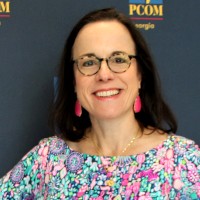By Barbara Myers
A teacher, a pharmacist, a public health advocate and a diabetes care and education specialist, Mandy Reece, a doctor of pharmacy is adding one more title to her resume. Recently diagnosed with breast cancer, Reece has become even more adamant about advocating for yearly mammograms for adult women.
Dr. Reece believes she has choices because her breast cancer was discovered early—a lumpectomy with radiation or a mastectomy with or without reconstruction? These are decisions she weighed carefully with her healthcare team.
A faculty member in the School of Pharmacy at the Suwanee campus of the Philadelphia College of Osteopathic Medicine, Dr. Reece said, “With my medical background, I am fortunate that I have the knowledge and skills to know how to properly research. I have access to scientific journals and databases to determine my prognosis. I can review the standard treatments based on the diagnosis, as well as appropriate medications. And most of all, I can understand the physiology and pathophysiology and what I’m reading in medical textbooks.”
She calls her breast cancer diagnosis “my little miracle.”
“It’s nothing short of a miracle,” she said.
A 1.5-centimeter tumor was found in Dr. Reece’s breast in late August. “It was not there last year,” she said. At age 47, Dr. Reece has been getting screening mammograms for seven years. Five of the seven times, she received a letter from the radiologist asking her to come back for a diagnostic mammogram.
This year, she noted, her experience was different. The technologist took extra time to make sure she had all the images needed and even consulted with the radiologist. “By the time I walked out of the building, I received a message in MyChart asking me to schedule a needle biopsy.” The radiologist explained the process and said that nine of ten women have negative results.
Again, a MyChart message alerted Dr. Reece to the fact that she had ductal carcinoma in situ, stage 0 or non-invasive breast cancer. An hour later, her primary care provider called her to discuss the diagnosis and next steps.
Dr. Reece went into student mode. She interviewed about six women who had been diagnosed with breast cancer and learned about the information they’d been given and why they chose their particular treatments.
After careful consideration, Dr. Reece opted for a bilateral mastectomy with reconstruction.“I chose a more radical route and each woman is different in the choice she makes.” She is waiting until October 30 for the surgery.
“What I’ve really learned is the value of a mammogram,” Dr. Reece said. Despite the research and the plan, there is still some anxiety and sadness. She hopes that sharing her journey will inspire others to get regular screening mammograms.
“They can save your life,” Dr. Reece said. “Get your mammogram every year. Make it a priority. If you’re ever diagnosed, it will give you more choices in your treatment.”
- Have a comment? Send to: elliott@brack.net










Follow Us